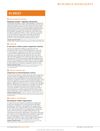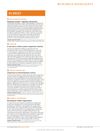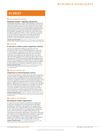 1 citations,
March 2021 in “Phytomedicine plus”
1 citations,
March 2021 in “Phytomedicine plus” Cernitin™, a pollen extract, was found to significantly reduce pain and inflammation in rats with chronic prostatitis, suggesting it could be a useful alternative to certain anti-inflammatory drugs.
 April 2019 in “Advances in integrative medicine”
April 2019 in “Advances in integrative medicine” HST and HST/F promote hair growth and may help treat alopecia.
 4 citations,
January 2019 in “Annals of Dermatology”
4 citations,
January 2019 in “Annals of Dermatology” RE-ORGA, a Korean herb extract, may help prevent hair loss.
 June 2017 in “The Journal of Clinical Endocrinology and Metabolism”
June 2017 in “The Journal of Clinical Endocrinology and Metabolism” Finasteride's sexual side effects not caused by androgen deficiency or SRD5A inhibition.
 August 2013 in “Nature Reviews Drug Discovery”
August 2013 in “Nature Reviews Drug Discovery” New treatments may restore cancer-blocking proteins, slow prostate cancer, identify drug targets, and potentially regrow hair.

New acne treatments like clascoterone and minocycline foam are effective, and using antibiotics carefully is important to avoid resistance.
3 citations,
November 2021 in “Journal of Clinical Laboratory Analysis” hsa_circ_0001079 may help diagnose and treat hair loss.
 51 citations,
November 2011 in “British Journal of Dermatology”
51 citations,
November 2011 in “British Journal of Dermatology” A gene called HDAC9 might be a new factor in male-pattern baldness.
 August 2016 in “Journal of Investigative Dermatology”
August 2016 in “Journal of Investigative Dermatology” Different levels of microRNAs in different parts of the scalp can cause male pattern baldness.
October 2022 in “Biomedicines” Finasteride in male rats causes liver and metabolic issues in their offspring.
 18 citations,
April 2011 in “International Journal of Molecular Medicine”
18 citations,
April 2011 in “International Journal of Molecular Medicine” Dihydrotestosterone causes p27 protein breakdown in ovarian and breast cancer cells by binding with SKP2.
28 citations,
November 2017 in “Molecular and cellular endocrinology” Testosterone and its byproducts help support male sexual behavior through different pathways in the brain and body.
 45 citations,
April 2018 in “Nature Reviews Urology”
45 citations,
April 2018 in “Nature Reviews Urology” Male genital development is driven by androgen signaling and understanding it could help address congenital anomalies.
2 citations,
May 2023 in “Frontiers in Pharmacology” Natural products may help treat skin inflammation from abnormal adrenal hormones.
 21 citations,
March 2019 in “Critical Reviews in Clinical Laboratory Sciences”
21 citations,
March 2019 in “Critical Reviews in Clinical Laboratory Sciences” The androgen receptor is a promising target for breast cancer treatment, especially in triple-negative cases, but more research is needed for personalized therapies.
1 citations,
July 2022 in “Clinical, Cosmetic and Investigational Dermatology” Taohong Siwu Decoction may help treat hair loss by targeting multiple genes and pathways.
9 citations,
December 2021 in “Androgens” Androgens like testosterone may help treat traumatic brain injury by reducing mitochondrial stress and inflammation.
2 citations,
January 2023 Nano-sized molybdenum may help treat hair loss and works well with minoxidil.
1 citations,
January 2015 in “Elsevier eBooks” Certain pesticides and fungicides can interfere with male hormone functions, potentially causing reproductive issues in male rats.
 November 2023 in “Bioorganic Chemistry”
November 2023 in “Bioorganic Chemistry” Drugs targeting the Androgen Receptor are effective for treating prostate cancer and other androgen-related conditions.
 September 2023 in “Frontiers in Medicine”
September 2023 in “Frontiers in Medicine” The scalp fat tissue of men with hair loss shows changes in gene activity that may contribute to their condition.
 45 citations,
November 2015 in “Dermatologic Clinics”
45 citations,
November 2015 in “Dermatologic Clinics” Hormones might affect the skin condition hidradenitis suppurativa, but their exact role is unclear.
 August 2013 in “Nature Reviews Drug Discovery”
August 2013 in “Nature Reviews Drug Discovery” New treatments for cancer and skin disorders show promise in disrupting harmful cell interactions and promoting hair growth.
 1 citations,
July 2023 in “Cureus”
1 citations,
July 2023 in “Cureus” Some treatments for hereditary hair loss are effective but vary in results and side effects; new therapies show promise but need more research.
 43 citations,
April 2017 in “Experimental Dermatology”
43 citations,
April 2017 in “Experimental Dermatology” Female pattern hair loss has unclear causes, possibly involving genetics, hormones, and environment, and needs better treatments.
 August 2013 in “Nature Reviews Drug Discovery”
August 2013 in “Nature Reviews Drug Discovery” New cancer treatments show promise in reducing tumor growth and improving skin regeneration in mice.
 August 2023 in “Journal of Cosmetic Dermatology”
August 2023 in “Journal of Cosmetic Dermatology” Exosomes from hair papilla cells and the Chinese medicine Liao Tuo Fang can potentially promote hair growth and could be used to develop hair growth drugs.
 March 2013 in “Hair transplant forum international”
March 2013 in “Hair transplant forum international” Inflammation linked to the immune response may play a role in causing various types of hair loss.
 May 2006 in “Women's Health Medicine”
May 2006 in “Women's Health Medicine” Excessive hair growth in women, often from high androgen levels, is usually caused by PCOS, and can be treated with hair removal, medication, and possibly weight loss.
Androgens increase norepinephrine release, promoting smooth muscle growth in male sex organs, which may contribute to benign prostatic hypertrophy.




















